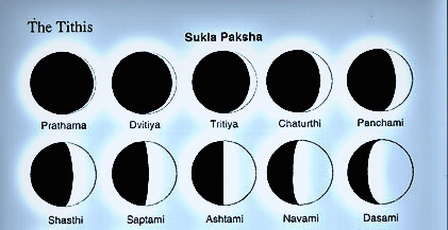Introduction
Tithi, an essential component of the Hindu lunar calendar, plays a significant role in Vedic astrology. It determines auspicious and inauspicious timings, influences personality traits, and is vital for conducting religious rituals. The term Tithi refers to the lunar day, calculated based on the angular distance between the Sun and the Moon. Understanding Tithi provides insights into an individual’s life, character, and destiny.
Meaning of Tithi
Tithi is defined as the time taken by the Moon to move 12 degrees ahead of the Sun. There are 30 Tithis in a lunar month, divided into two phases:
- Shukla Paksha (Waxing Phase) – The bright fortnight when the Moon is increasing in size.
- Krishna Paksha (Waning Phase) – The dark fortnight when the Moon is decreasing in size.
Each Tithi lasts approximately 19 to 26 hours and influences human behavior, events, and auspicious activities.
Classification of Tithis
The 30 Tithis are categorized into five groups based on their nature and suitability for different activities.
1. Nanda Tithi (Joy and Happiness)
- Pratipada (1st), Shashti (6th), Ekadashi (11th)
- Favorable for new beginnings, celebrations, and seeking joy.
2. Bhadra Tithi (Strength and Growth)
- Dvitiya (2nd), Saptami (7th), Dwadashi (12th)
- Suitable for financial growth, physical training, and initiating powerful ventures.
3. Jaya Tithi (Victory and Success)
- Tritiya (3rd), Ashtami (8th), Trayodashi (13th)
- Good for overcoming obstacles, winning battles, and achieving professional goals.
4. Rikta Tithi (Loss and Emptying)
- Chaturthi (4th), Navami (9th), Chaturdashi (14th)
- Generally avoided for important activities as they may lead to losses and difficulties.
5. Purna Tithi (Completion and Fulfillment)
- Panchami (5th), Dashami (10th), Purnima (15th – Full Moon), Amavasya (New Moon)
- Ideal for spiritual practices, charity, and completing pending work.
Importance of Tithi in Daily Life
Tithi influences both personal and social life. Understanding its significance can help individuals align their actions with cosmic energies.
1. Personal Impact
- Tithi at birth affects personality, emotions, and destiny.
- Determines mental tendencies, success, and emotional stability.
- Helps in understanding individual strengths and weaknesses.
2. Religious and Spiritual Significance
- Many Hindu festivals and rituals are based on Tithis.
- Performing Pooja, Vratas, and Yagnas on the right Tithi yields maximum benefits.
- Fasting on Ekadashi is believed to purify the soul and bring prosperity.
3. Marriage and Relationship Compatibility
- Matching Tithis in Kundali Milan ensures harmony in marriage.
- Certain Tithis like Chaturthi and Navami may cause disturbances in relationships.
4. Muhurta (Electional Astrology)
- Choosing an auspicious Tithi for events like weddings, business inaugurations, and housewarming enhances success and prosperity.
- Purnima and Shukla Paksha days are generally considered favorable, whereas Amavasya and Rikta Tithis should be avoided.
Tithi and Planetary Influences
Different Tithis are associated with various planetary energies, influencing their effects on individuals and events.
- Pratipada – Sun (Strength, Ego, Authority)
- Dvitiya – Moon (Emotions, Mind, Relationships)
- Tritiya – Mars (Courage, Determination, Aggression)
- Chaturthi – Mercury (Communication, Intelligence, Business Skills)
- Panchami – Jupiter (Wisdom, Spiritual Growth, Fortune)
- Shashti – Venus (Love, Beauty, Creativity)
- Saptami – Saturn (Discipline, Patience, Challenges)
- Ashtami – Rahu (Transformation, Hidden Desires, Obstacles)
- Navami – Ketu (Detachment, Spirituality, Mysticism)
Understanding these influences can help in planning activities for maximum success and harmony.
Special Tithis and Their Significance
Certain Tithis hold great importance in Hindu traditions and are considered highly auspicious or inauspicious.
1. Ekadashi (11th Tithi)
- Dedicated to Lord Vishnu.
- Fasting on Ekadashi helps in attaining spiritual upliftment and good health.
2. Purnima (Full Moon)
- Highly auspicious for worship, meditation, and positive activities.
- Festivals like Guru Purnima and Buddha Purnima are observed on this day.
3. Amavasya (New Moon)
- Considered inauspicious for new beginnings but ideal for ancestor rituals (Pitru Tarpan).
- Affects mental and emotional well-being, leading to mood swings and restlessness.
4. Chaturdashi (14th Tithi)
- Krishna Paksha Chaturdashi is observed as Maha Shivaratri.
- Ideal for spiritual awakening and overcoming obstacles.
Tithi Remedies for Balancing Energies
If an individual’s birth Tithi creates challenges in life, Vedic remedies can help mitigate the negative effects and enhance positive influences.
1. Mantra Chanting
- Chanting Om Namah Shivaya on Chaturdashi for overcoming obstacles.
- Reciting Vishnu Sahasranama on Ekadashi for spiritual growth.
2. Charity and Donations
- Donating food and clothes on Amavasya helps in pacifying ancestral doshas.
- Offering milk and sweets to Brahmins on Purnima enhances blessings.
3. Fasting and Meditation
- Observing fasts on auspicious Tithis cleanses the mind and body.
- Practicing meditation on Purnima increases mental clarity and peace.
Conclusion
Tithi in Vedic astrology is an integral aspect of timekeeping and planning, influencing every aspect of human life. By understanding Tithi’s impact on personality, relationships, and events, one can align their actions with cosmic rhythms. Proper knowledge and application of Tithi principles ensure a harmonious and successful life, blending spiritual and material well-being.
